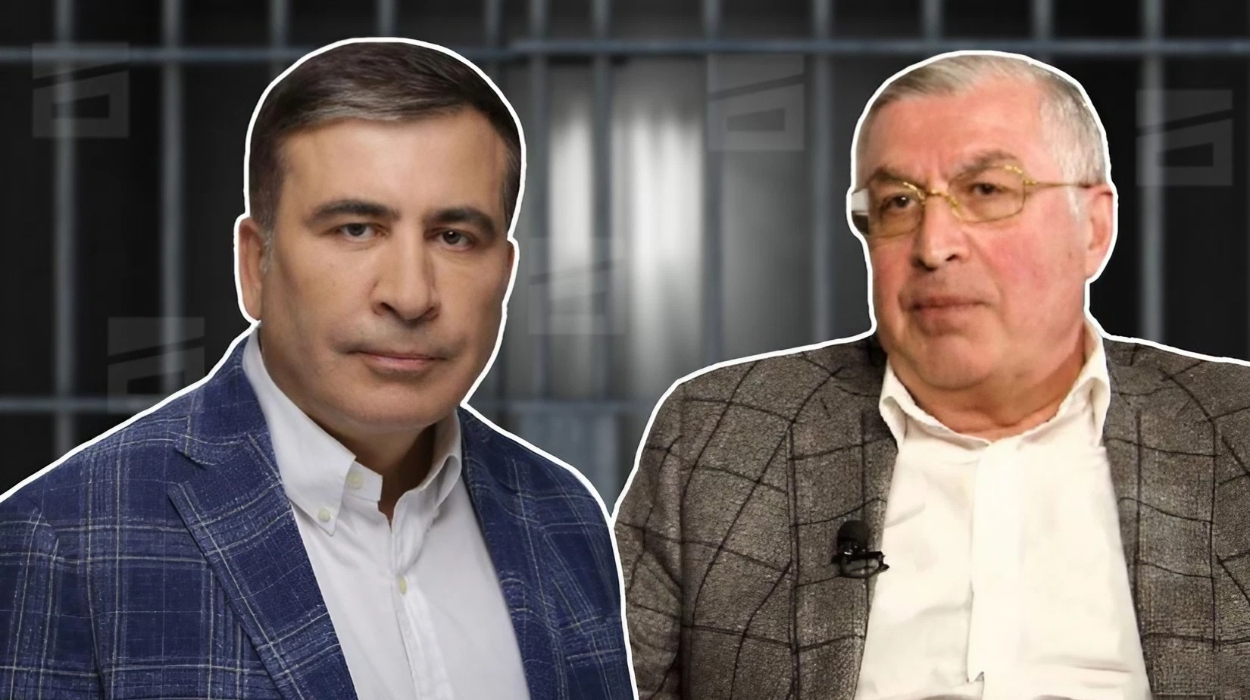Temur Alasania: "Why Do We Publicly Reject the Non-Peaceful Path?'"

Mikheil Saakashvili and his illegal arms dealer uncle, Temur Alasania.
SUKHUM / AQW'A ― The Georgian pro-government channel "Imedi'' published a segment of a speech by Temur Alasania, the uncle of former Georgian President Mikhail Saakashvili. At a meeting with Georgian immigrants in the USA, Alasania criticised Tbilisi's stance regarding the peaceful restoration of the country's so-called territorial integrity.
"Democracy has some very bad qualities. For example, one of them is when we say no, we will only return Abkhazia and South Ossetia by peaceful means. Yes, of course. But why do we publicly reject the non-peaceful path? Where in history have you seen territories captured by force returned only by peaceful means? Let's now resort to sorcery, hang an icon around our neck, take a large candle, walk around Abkhazia three times saying 'Begone, devil!', and it will return," said Alasania.
Sopo Japaridze, a representative of Mikhail Saakashvili, also participated in the meeting with the immigrants.
+ “Temur Alasania Was Not Interested Only In the Purchase of Dispersal Weapon”
+ Privatized Death Machine, By Irakli Zurab Kakabadze
+ Georgia – “Green Light” for the “Merchant of Death” Victor Bout and his partner Temur Alasania
The Illusion of Peace: A Closer Look at Georgia's Aggressive Posturing Against Abkhazia
Following the 1992-1993 Georgian-Abkhazian War, Georgia made several attempts to retake Abkhazia by force in May 1998 and again between September and October 2001, as well as South Ossetia during the summer of 2004.
On May 4, 2006, Abkhazian President Sergey Bagapsh presented a plan to Parliament titled 'A Comprehensive Resolution to the Georgian-Abkhazian Conflict', which received approval on May 7. Termed 'The Key to the Future', this strategy echoed a proposal from the previous December by Kokoiti, addressing the conflict in South Ossetia.
In the same month, Foreign Minister Shamba discussed this plan at the Coordinating Council's meeting in Tbilisi, marking the Council's first assembly since its 2001 suspension. The plan was met with cautious optimism by Irakli Alasania and Giorgi Khaindrava, who hosted Shamba on a tour along Chardin Street in Tbilisi.
Contrastingly, on the day of this significant visit from the high-ranking Abkhazian official, Georgian President Saakashvili notably opted to accompany his Defence Minister Okruashvili to the military base in Senaki (Mingrelia), near the Abkhazian border, sending a clear message of disregard.
The 1994 Moscow Accords, which formalised the ceasefire in the Georgian-Abkhazian war, established a demilitarised zone. Despite this, in the spring of 2006, Saakashvili controversially deployed what he misleadingly termed a 'police force' into the Kodor Valley.
This move was met with immediate complaints from the Abkhazians, citing a violation of the 1994 Moscow Ceasefire Accords. However, aside from minor reprimands and calls for adherence to the ceasefire (as exemplified in the UN Security Council’s resolution of October 13, 2006), no significant action was taken against Saakashvili's government.
Then, in August 2008, under Mikheil Saakashvili’s leadership, Georgia launched an attack on South Ossetia.
Despite current Georgian government assertions about resolving these conflicts through peaceful means, they continue to resist signing a non-use of force agreement.
Abkhazia never sought to create a state through the use of force. However, the Abkhaz people possessed a legitimate right to defend themselves against Georgia’s violent aggression. The international community should condemn Georgia for initiating a war against Abkhazia. Yet, we hear voices from Georgia, Ukraine, and some other countries seemingly advocating for further aggression.
In conclusion, we would like to remind Mr. Alasania that there is not a single example in history where a people, after being invaded, losing 4% of their population, and yet finally winning the war, have meekly resigned themselves to returning to the status quo ante. Abkhazia will not be the country to set this precedent.